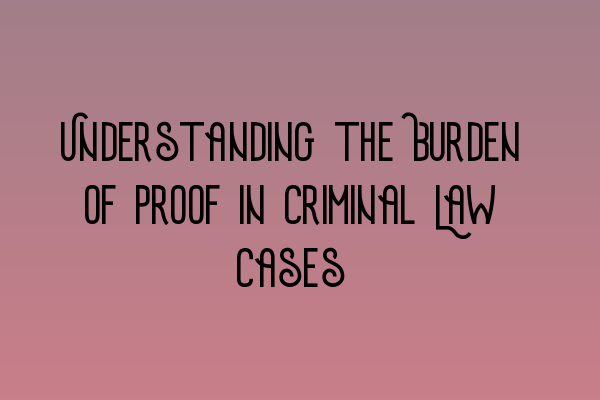Understanding the Burden of Proof in Criminal Law Cases
In criminal law cases, the burden of proof plays a crucial role. It is the responsibility of the prosecution to prove beyond a reasonable doubt that the defendant is guilty of the alleged crime. Understanding the burden of proof is essential for both legal professionals and individuals involved in criminal cases. In this article, we will explore the concept of burden of proof in criminal law and its significance in determining the outcome of a case.
What is the Burden of Proof?
The burden of proof refers to the obligation of the prosecution to present sufficient evidence to convince the court or jury of the guilt of the accused. The standard of proof in criminal cases is “beyond a reasonable doubt,” which is the highest standard of proof in legal proceedings. It requires that the evidence presented must be so convincing that there is no reasonable doubt of the defendant’s guilt.
It is important to note that the burden of proof rests solely with the prosecution. The defendant is not required to prove their innocence; instead, they are presumed innocent until proven guilty. This principle forms a fundamental aspect of the criminal justice system, ensuring fairness and protecting individuals from wrongful convictions.
Importance of the Burden of Proof
The burden of proof is of paramount importance in criminal law cases. It serves as a safeguard against potential injustices and ensures that guilt is not attributed to an individual without sufficient evidence. By placing the burden on the prosecution, the law recognizes the need for a high level of certainty before imposing criminal liability.
Proper understanding and application of the burden of proof are crucial for legal professionals. As a solicitor or barrister, it is essential to analyze and evaluate the evidence presented by the prosecution, identify weaknesses or inconsistencies, and establish a strong defense to challenge the burden of proof. For individuals facing criminal charges, understanding the burden of proof can help them navigate the legal process and protect their rights.
Challenging the Burden of Proof
There are various strategies that legal professionals can employ to challenge the burden of proof. These include:
- Highlighting inconsistencies in witness testimonies
- Identifying flaws in the collection or handling of evidence
- Presenting alibis or evidence supporting alternative theories
- Engaging expert witnesses to challenge the prosecution’s evidence
By scrutinizing the evidence and applying effective defense strategies, legal professionals can weaken the prosecution’s case and raise reasonable doubt in the minds of the court or jury.
Conclusion
The burden of proof is a fundamental aspect of criminal law cases. It places the responsibility on the prosecution to prove the guilt of the accused beyond a reasonable doubt. Understanding the burden of proof is essential for legal professionals and individuals involved in criminal cases. By comprehending the significance of the burden of proof and employing effective defense strategies, legal professionals can safeguard the rights and interests of their clients.
For more information on criminal law and preparing for the SQE exams, check out our related articles:
